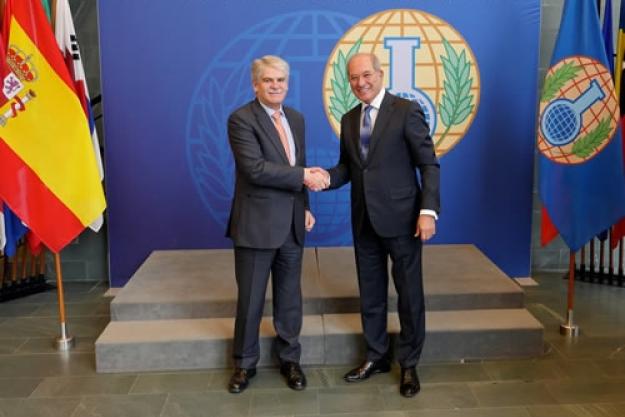
OPCW Director-General Ahmet Üzümcü (right) and the Minister of Foreign Affairs and Cooperation of the Kingdom of Spain, H.E. Mr Alfonso Dastis Quecedo
THE HAGUE, Netherlands — 30 January 2017 — The Director-General of the Organisation for the Prohibition of Chemical Weapons (OPCW), Ambassador Ahmet Üzümcü, and the Minister of Foreign Affairs and Cooperation of the Kingdom of Spain, H.E. Mr Alfonso Dastis Quecedo, reaffirmed their commitment to achieving full and lasting chemical disarmament, in a meeting at OPCW Headquarters in The Hague today.
The Director-General and Foreign Minster discussed their on-going efforts to advance the goals of the Chemical Weapons Convention. Special emphasis was placed upon the need for a concerted effort to counter non-state actors’ use of chemical weapons.
The Director-General also used this opportunity to express again his gratitude to Spain for their voluntary contributions towards a variety of international cooperation and scientific initiatives, as well as their support for the removal and destruction of the remnants of Libya’s chemical weapon programme outside its territory.
“I thank Spain for its steadfast contributions toward achieving a world free of chemical weapons. We reaffirmed today our shared commitment to face together future challenges to achieving this goal,” stated Ambassador Üzümcü.
Background
Spain joined the Chemical Weapons Convention in 1997 and is currently a member of the OPCW Executive Council.
Between 2007 and 2016 Spain has actively engaged in and contributed approximately 250,000 EUR towards OPCW projects in the areas of capacity-building, assistance and protection, national implementation, and scientific development.
As the implementing body for the Chemical Weapons Convention, the OPCW oversees the global endeavour to permanently eliminate chemical weapons. Since the Convention’s entry into force in 1997 – with its 192 States Parties – it is the most successful disarmament treaty eliminating an entire class of weapons of mass destruction.
To date, nearly 94 per cent of all chemical weapon stockpiles declared by possessor States have been destroyed under OPCW verification. For its extensive efforts in eliminating chemical weapons, the OPCW received the 2013 Nobel Prize for Peace.
More Information
